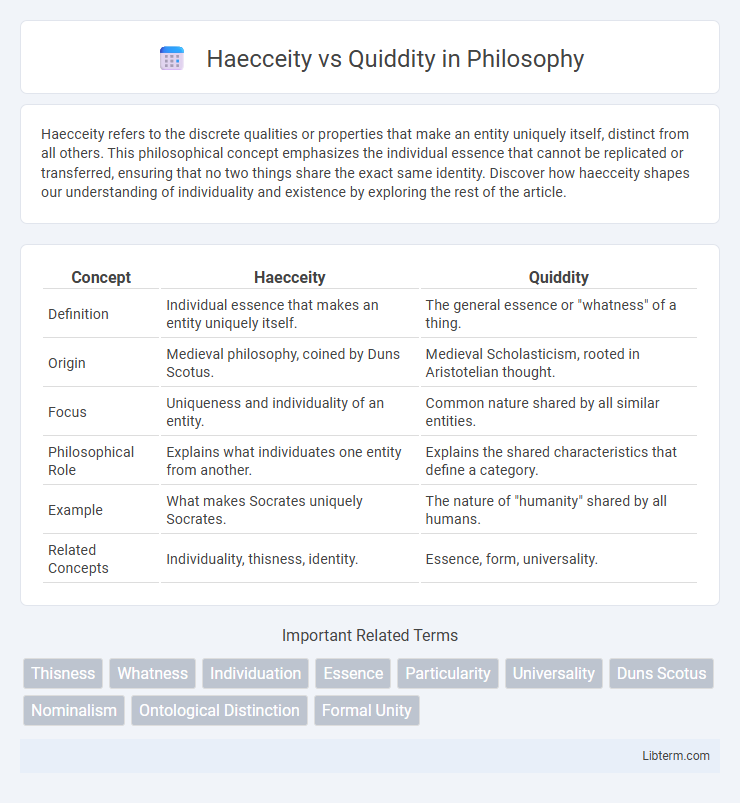Haecceity refers to the discrete qualities or properties that make an entity uniquely itself, distinct from all others. This philosophical concept emphasizes the individual essence that cannot be replicated or transferred, ensuring that no two things share the exact same identity. Discover how haecceity shapes our understanding of individuality and existence by exploring the rest of the article.
Table of Comparison
| Concept | Haecceity | Quiddity |
|---|---|---|
| Definition | Individual essence that makes an entity uniquely itself. | The general essence or "whatness" of a thing. |
| Origin | Medieval philosophy, coined by Duns Scotus. | Medieval Scholasticism, rooted in Aristotelian thought. |
| Focus | Uniqueness and individuality of an entity. | Common nature shared by all similar entities. |
| Philosophical Role | Explains what individuates one entity from another. | Explains the shared characteristics that define a category. |
| Example | What makes Socrates uniquely Socrates. | The nature of "humanity" shared by all humans. |
| Related Concepts | Individuality, thisness, identity. | Essence, form, universality. |
Introduction to Haecceity and Quiddity
Haecceity refers to the discrete qualities or properties that make an individual entity uniquely itself, distinguishing it from all others. Quiddity denotes the essence or "whatness" of a thing, representing the universal characteristics shared by members of a particular category or species. Understanding the distinction between haecceity and quiddity is fundamental in metaphysics for analyzing individuality versus generality in objects and concepts.
Etymology and Historical Origins
Haecceity, derived from the Latin "haecceitas," stems from "haec," meaning "this," emphasizing the individual essence that makes an entity uniquely itself. Quiddity originates from the Latin "quidditas," based on "quid," meaning "what," highlighting the general nature or the "whatness" of a thing shared among entities of the same kind. Philosophical discussions on haecceity and quiddity trace back to medieval scholasticism, especially within the works of Duns Scotus, who differentiated the unique individuality (haecceity) from universal essence (quiddity).
Haecceity: Definition and Philosophical Significance
Haecceity refers to the discrete qualities or properties that make an individual entity uniquely itself, distinguishing it from all others. In metaphysics, it serves as the principle of individuation, emphasizing the concrete, particular essence that cannot be shared or generalized. Philosophically, haecceity challenges abstract universalism by underscoring the irreducible singularity of entities in discussions of identity and ontology.
Quiddity: Definition and Philosophical Importance
Quiddity refers to the essence or "whatness" of a thing, defining its fundamental nature that distinguishes it from all others. Philosophically, quiddity is central to metaphysics and ontology because it addresses the universal characteristics that make an entity identifiable across different instances. Understanding quiddity enables scholars to explore the properties that give objects their identity beyond mere existence or individuality.
Key Differences Between Haecceity and Quiddity
Haecceity refers to the individuating property that makes an entity uniquely itself, emphasizing the "thisness" of a particular object or person. Quiddity denotes the essence or "whatness" that defines the general nature or category of an entity shared among similar beings. Key differences lie in haecceity's role in singular individuation versus quiddity's function in universal classification and conceptual understanding.
Haecceity in Medieval and Modern Philosophy
Haecceity, in Medieval and Modern Philosophy, refers to the discrete qualities that make an individual entity uniquely itself, distinguishing it from all others by its "thisness." Philosophers like Duns Scotus emphasized haecceity as the principle of individuation, contrasting it with quiddity, which defines the general essence or "whatness" common to a category of beings. In modern discussions, haecceity remains pivotal in metaphysics and ontology for understanding identity, individuality, and the uniqueness of objects beyond their universal properties.
Quiddity in Scholastic Thought and Beyond
Quiddity, or the "whatness" of a thing, represents its essential nature as defined in Scholastic philosophy to distinguish the universal essence shared by all instances of a species. This concept, derived from Latin quidditas, is crucial for understanding how medieval philosophers like Thomas Aquinas categorized entities based on their defining characteristics beyond mere existence. Beyond Scholasticism, quiddity influences modern metaphysics and ontology by framing debates about identity, universals, and the nature of reality.
Prominent Philosophers on Haecceity and Quiddity
Duns Scotus is a prominent philosopher known for his development of haecceity, which refers to the discrete qualities that make an individual entity uniquely itself. Thomas Aquinas, on the other hand, emphasized quiddity, the essence or "whatness" of a thing, defining it as the common nature shared by multiple entities. Contemporary metaphysicians often contrast these concepts to explore individuality versus universality in ontological studies.
Applications and Implications in Contemporary Philosophy
Haecceity, denoting the unique thisness that individuates entities, plays a crucial role in contemporary metaphysics by challenging reductive frameworks that overlook individuality, whereas quiddity, or the whatness defining a thing's essence, underpins essentialist debates about categorization and identity. The application of haecceity fosters nuanced discussions in ontology and personal identity, influencing theories in phenomenology and modal logic by emphasizing singularity over universality. Quiddity's implications extend to epistemology and linguistic analysis, shaping how concepts and categories are constructed and maintained, thereby affecting cognitive science and artificial intelligence models of classification.
Conclusion: The Enduring Relevance of Haecceity and Quiddity
Haecceity and quiddity remain crucial concepts in metaphysics, distinguishing the unique individual essence from the general nature shared by a category. Their enduring relevance lies in clarifying debates about identity, individuality, and universals across philosophy, cognitive science, and ontology. Understanding these concepts enhances insights into how beings are defined both uniquely and categorically.
Haecceity Infographic

 libterm.com
libterm.com